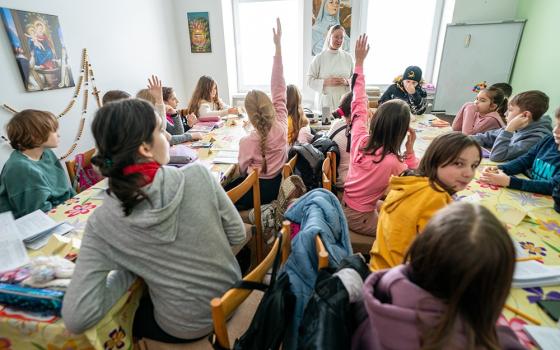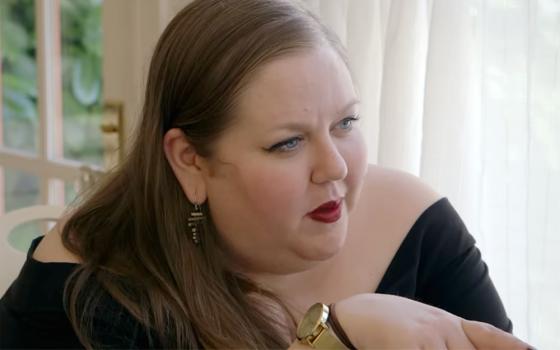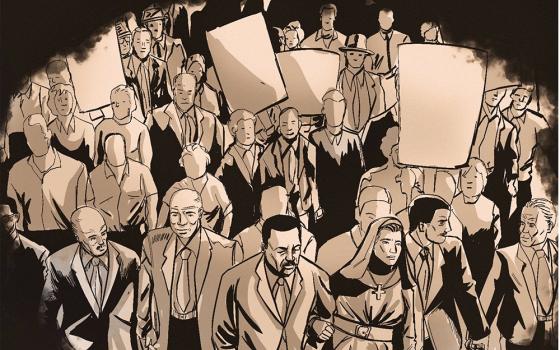In the midst of all the pageantry and intrigue surrounding the recent Republican and Democratic Party conventions, it can be easy to lose sight of the struggles and wounds that continue to mark the everyday existence of many residents of this nation.
Those watching the Democratic convention on July 26 were served a potent reminder of these stark realities when nine "Mothers of the Movement" spoke about their black daughters and sons who had been killed by police officers and armed civilians, even if the ultimate reason for the mothers' presence at the convention was to endorse Hillary Clinton.
I watched them speak and my mind was prompted to recall July 5-7, those horrific three days when two officers killed Alton Sterling in Baton Rouge, La., an officer killed Philando Castile in Falcon Heights, Minn., and a sniper killed five officers in Dallas.
Although it received little attention, Archbishop Joseph Kurtz of Louisville, Ky., responded to these events by issuing a brief July 8 statement on behalf of the United States Conference of Catholic Bishops calling for prayer and peace. While it is good for bishops to encourage people to pray, it remains unclear what they were asking Catholics to pray for. Despite the good intentions of the bishops, there is reason to believe that this obscure gesture toward peace was counterproductive and harmful.
The bishops close their statement by praying "for the comfort of everyone affected and that our national conversation will bear the good fruit of healing and peace." However, it is hugely misguided to pray for peace without praying for justice first. Not only is it not scriptural, it is false and practically unsustainable to pray for an end to hostilities if one is not also willing to address the root underlying causes of social conflict. In the current social situation of the United States, a major root cause is our system of racial apartheid. The bishops seem relatively unaware or unconcerned about that as the context within which these killings happened.
The bishops write that "the police are not a faceless enemy. They are sons and daughters offering their lives to protect their brothers and sisters. Jesus reminds us, 'no one has greater love than this, to lay down one's life for one's friends.' " While police officers certainly take personal risks as part of their job, it is very theologically dangerous to use this language from the Gospel of John to sacralize the profession. Doing so can have the effect of excusing or even justifying police misconduct. Besides, this is hardly what the evangelist was talking about, considering that Jesus was risking his life without any recourse to weapons for protection. He did so in defiance of the civil authorities of his own time, and he invited his own followers to do the same.
The statement completely fails to mention that Alton and Philando were black. It simply refers to them as "two men" and even as "suspects." These omissions effectively erase their particularity as black human beings who were killed in a manner that would not have happened were they white.
The bishops were also silent when Alton and Philando were killed. They only felt compelled to make a statement when five police officers were killed, four of whom were white. This gives the impression to the faithful that the lives of the former were not as important, and it also sends a signal about where their loyalties lie. Such partiality with the ruling racial caste of society is not acceptable for ministers of the Gospel. This is all the more appalling when one considers their assertion that they stand for "the life and dignity of all persons, regardless of their station in life," as created equally in the image of God. Their actions and inactions testify otherwise.
Any statement that frames the current situation of social conflict as "race relations" rather than racial injustice completely misunderstands the gravity of the situation. This framing is incapable of providing a credible vision of what justice would look like in the Kingdom of God as regards to our nation's current practices of residential/economic/educational segregation and mass incarceration.
The bishops have again failed to acknowledge any shared responsibility for racial injustices on the part of the church, as manifested in its complicity in slavery and Jim Crow, its unreliable support toward and even opposition to the civil rights movement, and its chilly reception of the Black Lives Matter movement.
Unfortunately, this is nothing new, because the bishops' 1979 pastoral letter on racism, "Brothers and Sisters to Us," made the same mistake by not recognizing the sin of racism precisely as a social sin in which the church partakes, as Fr. Bryan Massingale notes in his 2010 book, Racial Justice and the Catholic Church. The Bishops' Committee on Black Catholics, in their 1989 follow-up document "For the Love of One Another," noted that the 1979 letter received "a pathetic, anemic response" from U.S. Catholics because it was not properly promoted or implemented by bishops and priests who lacked the courage to speak the truth to majority white parishes.
Black Catholics are quite familiar with this pattern of ineffective witness against racism. Boston College theologian M. Shawn Copeland, writing in a July 2014 issue of America, joined her own voice with others who have observed that "the church as a whole has never gone 'out of its way to make blacks feel welcome as Catholics' in the United States." Being the sole exception to the bishops' deafening silence about the Black Lives Matter movement, Bishop Edward Braxton of Belleville, Ill., wrote in the May 16 issue of America: "The primary impression some movement supporters have of the church is that it is a large, white, conservative (mainly Republican) institution that stands aloof from confrontational movements like Black Lives Matter." Even if this perception is not entirely true in light of the actual racial composition and political affiliations of U.S. Catholics, perhaps the bishops ought to consider carefully whether their own patterns of speech and silence, actions and inactions, have contributed to this perception.
So, do the bishops want the general public to think that the Catholic church is a racist institution? As a Catholic and a theologian, I would certainly not want this to be the public's impression, but it is becoming more difficult for me to convince people otherwise. A statement like this, which reflects no serious intellectual engagement with the emerging critical consciousness about race and policing, is part of the public face of the institution. Despite the bishops' past and present ineptitude in leading American Catholics, and particularly white Catholics, to confront their own complicity in racism, they can and must do better than this recent statement. Any possibility of their having moral authority and credibility depends on their willingness to do so.
There have been some small signs of hope in recent days. The National Black Catholic Congress issued a statement on July 13 calling not only for prayer and peace but also for participation in political dialogue about the root systemic causes of racial injustice. On July 21, Atlanta Archbishop Wilton Gregory was appointed to lead an ad hoc task force organized to advise the bishops and prevent further violence in the communities they serve.
Although these official initiatives are indeed positive steps, the practical fruit of them remains to be seen. The great theological and ethical variable in this equation remains: Will the bishops ultimately listen to black Catholics and take a public stand for justice at this critical moment, or will they continue to miss the mark by calling for a false peace?
[Michael Jaycox is assistant professor of Christian Ethics at Seattle University, where he teaches undergraduate theology courses and maintains a strong research profile on racial justice. He has been a white participant in the Black Lives Matter movement himself in St. Louis, Ferguson, and Seattle, and his forthcoming book will be titled Social Anger and the Struggle for Justice: Emotion, Grassroots Protest, and Catholic Social Ethics.]



